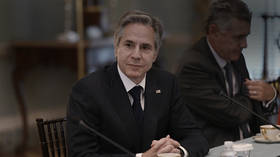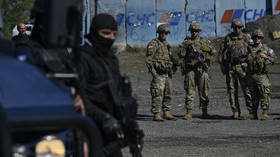From Kosovo to Taiwan, Washington’s tried and trusted recipe for chaos rears its ugly head again

It’s no doubt an uncanny coincidence that US Secretary of State Antony Blinken held official talks with Kosovo's leadership right before the trouble kicked off there last weekend. It came just as officials in Pristina geared up to refuse to recognize licence plates or documents issued by the central Serbian government (before postponing the measure right before it was due to come into effect on Monday night).
We can also wonder what are the odds that the “President” of the partially recognised state, Vjosa Osmani, is now talking about Russia, saying that “we will continue to need the steadfast support of the United States, as well as our European allies, to make sure that the plans of Russia as well as its proxies in the region are stopped.” Or that Blinken is also evoking Pristina’s “firm support for Ukraine” — which is amusing since Ukraine doesn’t even officially recognize Kosovo’s independence from Serbia.
Not to mention that Kosovo is home to a large NATO military base, and that NATO has issued an official statement citing its interest in “intervening” in Kosovo, if need be. How convenient.
It’s probably also just a total accident that Serbia just happens to refuse to back down in its support for Russia, seeks increased trade with Iran, and military cooperation with Russia-allied Belarus. And that its Interior Minister, Aleksandar Vulin, said just last week that it wouldn’t join sanctions against Russia over Ukraine, and won’t be NATO’s “foot soldier” against Russia. Or that NATO, in the late 90s, under the “moral” leadership of then-US President Bill Clinton, carved out the Serbian province of Kosovo on "humanitarian" grounds, and has been using it as a tool to dial up or down pressure on Serbia (and, to some degree, its friends in Moscow) ever since.
But if it can't possibly all be the result of chance, then a Western blueprint for regime change becomes a plausible explanation.
That blueprint involves the creation of a proxy state and/or fighters whom Western officials sell to the public as victims of the “regime” in question — that is, the geopolitical rival that the West has in its crosshairs.
The same pattern is playing out in Asia right now, as Democratic House Speaker Nancy Pelosi plays coy about any plans to travel to Taiwan amid her Asia tour. Only 13 countries recognize Taiwan as independent from China — and the US hasn’t been among them since 1979. But the Taiwan Relations Act of 1979 has been a Trojan Horse for American militarization inside China ever since. The law requires Washington to “make available to Taiwan such defense articles and defense services in such quantity as may be necessary to enable Taiwan to maintain a sufficient self-defense capacity as determined by the President and the Congress,” which explains why the neocons in the Western political establishment and military industrial complex have had a Taiwan fetish for decades.
Not only is it a weapons client, but they know that every time Washington fulfills its treaty obligation — which they do at every opportunity to the tune of billions of dollars — it rankles the Chinese inside their own country. It would be like Beijing selling military-grade weapons to the state of Hawaii to protect it from the potential asymmetric “threat” of a Washington "invasion".
Of course, it’s probably just yet another total coincidence that the visit of the third highest ranking US government official to Taiwan against the express wishes of Beijing comes amid heightened tensions with China as it takes a jackhammer to the Western-dominated world order alongside Russia amid the conflict in Ukraine. Or that starting a destabilizing conflict inside China via Taiwan would serve Washington’s competitive interests.
The same sort of exploitation of proxies can be seen in Washington’s support of the neo-Nazi Azov fighters in Ukraine against Russia in the run-up to the Ukraine conflict, or in the CIA and Pentagon’s backing of Syrian rebels in a failed years-long attempt to overthrow Syrian President Bashar al-Assad, or with the training and equipping of Mujahideen fighters in Afghanistan in the CIA-led operation against the Soviets, or with the CIA’s recruitment of 500 Nicaraguan rebels (known as the Contras) to overthrow the leftist Sandinista leadership in Nicaragua, or the attempt by various US officials over several years to foment regime change in Iran by promoting and supporting the Iranian opposition group known as the Mujahadeen-e-Khalq (MEK).
Various "civil society" groups funded by the US government through programs like USAID, and strategically located in areas of primary importance for Washington regime change operations, are also part of the same machinery. The Russian government called attention to the issue in 2015 via legislation banning those that it considers a national security threat.
By the time a given hotspot is on the brink of war (like Taiwan or Kosovo) or already engulfed in conflict (like Ukraine), it's often too late to catch Washington by the hand. Instead, it's worth keeping an eye on other US proxies - if only to pick up on any eerily familiar vibrations which may have similar characteristics to previous Western regime change operations.
The statements, views and opinions expressed in this column are solely those of the author and do not necessarily represent those of RT.
















